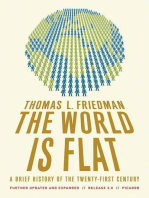Title
Title
Uploaded by
Cindyy MayorCopyright:
Available Formats
Title
Title
Uploaded by
Cindyy MayorOriginal Description:
Copyright
Available Formats
Share this document
Did you find this document useful?
Is this content inappropriate?
Copyright:
Available Formats
Title
Title
Uploaded by
Cindyy MayorCopyright:
Available Formats
Title: Reflection on Pollution: A Global Concern
Introduction:
Pollution is an issue that has plagued our world for many decades, and its detrimental effects
continue to intensify. This reaction paper aims to reflect on the multifaceted problem of pollution,
highlighting its various forms, consequences, and the urgent need for collective action to mitigate its
impact on the environment and human health.
Forms of Pollution:
Pollution takes many forms, including air pollution, water pollution, soil pollution, and noise
pollution. Each of these manifestations contributes to environmental degradation and poses
significant health risks to both humans and the planet. The causes of pollution are diverse, ranging
from industrial activities and transportation to deforestation and improper waste disposal.
Consequences of Pollution:
The consequences of pollution are far-reaching, affecting ecosystems, human health, and the overall
quality of life. Some notable consequences include:
Environmental Degradation: Pollution disrupts ecosystems, leading to the loss of biodiversity and the
destruction of habitats. It can also have long-term effects on the health of ecosystems, making it
difficult for them to recover.
Climate Change: The release of greenhouse gases, a form of air pollution, contributes to climate
change by trapping heat in the Earth's atmosphere. This leads to rising global temperatures, more
frequent extreme weather events, and other ecological disruptions.
Health Impacts: Pollution is a major public health concern, causing respiratory diseases, cancers, and
various other ailments. Vulnerable populations, such as children, the elderly, and those with pre-
existing health conditions, are particularly at risk.
Economic Costs: Pollution results in economic losses due to healthcare expenses, decreased
agricultural productivity, and damage to infrastructure. This financial burden affects both individuals
and governments.
The Urgent Need for Collective Action:
Addressing pollution is a shared responsibility that demands global cooperation and concerted
efforts at every level of society. Governments, industries, and individuals must all play their part in
reducing pollution. Here are some strategies to combat pollution effectively:
Strict Regulations: Governments must implement and enforce stringent environmental regulations to
limit pollutant emissions and promote clean energy solutions.
Sustainable Practices: Industries should adopt sustainable and eco-friendly practices, reducing waste
production, and implementing cleaner technologies.
Individual Responsibility: Individuals can reduce their carbon footprint by conserving energy, using
public transportation, reducing waste, and supporting environmentally friendly products and
practices.
Education and Awareness: Raising awareness about pollution and its consequences is essential.
Education can inspire people to take action and make environmentally conscious choices.
Conclusion:
Pollution is a complex and pressing global issue that demands immediate attention. The
consequences of pollution extend beyond environmental damage and directly impact human health
and well-being. To combat pollution effectively, we must all work together to reduce emissions,
adopt sustainable practices, and foster a greater sense of responsibility towards our environment. By
acknowledging the severity of the problem and taking proactive steps to mitigate its impact, we can
pave the way for a cleaner, healthier, and more sustainable future.
You might also like
- The Subtle Art of Not Giving a F*ck: A Counterintuitive Approach to Living a Good LifeFrom EverandThe Subtle Art of Not Giving a F*ck: A Counterintuitive Approach to Living a Good LifeRating: 4 out of 5 stars4/5 (5891)
- The Gifts of Imperfection: Let Go of Who You Think You're Supposed to Be and Embrace Who You AreFrom EverandThe Gifts of Imperfection: Let Go of Who You Think You're Supposed to Be and Embrace Who You AreRating: 4 out of 5 stars4/5 (1103)
- Never Split the Difference: Negotiating As If Your Life Depended On ItFrom EverandNever Split the Difference: Negotiating As If Your Life Depended On ItRating: 4.5 out of 5 stars4.5/5 (870)
- Grit: The Power of Passion and PerseveranceFrom EverandGrit: The Power of Passion and PerseveranceRating: 4 out of 5 stars4/5 (597)
- Hidden Figures: The American Dream and the Untold Story of the Black Women Mathematicians Who Helped Win the Space RaceFrom EverandHidden Figures: The American Dream and the Untold Story of the Black Women Mathematicians Who Helped Win the Space RaceRating: 4 out of 5 stars4/5 (912)
- Shoe Dog: A Memoir by the Creator of NikeFrom EverandShoe Dog: A Memoir by the Creator of NikeRating: 4.5 out of 5 stars4.5/5 (543)
- The Hard Thing About Hard Things: Building a Business When There Are No Easy AnswersFrom EverandThe Hard Thing About Hard Things: Building a Business When There Are No Easy AnswersRating: 4.5 out of 5 stars4.5/5 (352)
- Elon Musk: Tesla, SpaceX, and the Quest for a Fantastic FutureFrom EverandElon Musk: Tesla, SpaceX, and the Quest for a Fantastic FutureRating: 4.5 out of 5 stars4.5/5 (474)
- Her Body and Other Parties: StoriesFrom EverandHer Body and Other Parties: StoriesRating: 4 out of 5 stars4/5 (830)
- The Sympathizer: A Novel (Pulitzer Prize for Fiction)From EverandThe Sympathizer: A Novel (Pulitzer Prize for Fiction)Rating: 4.5 out of 5 stars4.5/5 (122)
- The Emperor of All Maladies: A Biography of CancerFrom EverandThe Emperor of All Maladies: A Biography of CancerRating: 4.5 out of 5 stars4.5/5 (272)
- The Little Book of Hygge: Danish Secrets to Happy LivingFrom EverandThe Little Book of Hygge: Danish Secrets to Happy LivingRating: 3.5 out of 5 stars3.5/5 (414)
- Supplementary Outcome Appendix GDocument3 pagesSupplementary Outcome Appendix Gburcu ersahinNo ratings yet
- The Yellow House: A Memoir (2019 National Book Award Winner)From EverandThe Yellow House: A Memoir (2019 National Book Award Winner)Rating: 4 out of 5 stars4/5 (99)
- The World Is Flat 3.0: A Brief History of the Twenty-first CenturyFrom EverandThe World Is Flat 3.0: A Brief History of the Twenty-first CenturyRating: 3.5 out of 5 stars3.5/5 (2270)
- Devil in the Grove: Thurgood Marshall, the Groveland Boys, and the Dawn of a New AmericaFrom EverandDevil in the Grove: Thurgood Marshall, the Groveland Boys, and the Dawn of a New AmericaRating: 4.5 out of 5 stars4.5/5 (269)
- Team of Rivals: The Political Genius of Abraham LincolnFrom EverandTeam of Rivals: The Political Genius of Abraham LincolnRating: 4.5 out of 5 stars4.5/5 (235)
- A Heartbreaking Work Of Staggering Genius: A Memoir Based on a True StoryFrom EverandA Heartbreaking Work Of Staggering Genius: A Memoir Based on a True StoryRating: 3.5 out of 5 stars3.5/5 (232)
- Test Bank For Davis Advantage For Medical Surgical Nursing Making Connections To Practice 1st EditionDocument24 pagesTest Bank For Davis Advantage For Medical Surgical Nursing Making Connections To Practice 1st EditionStephenRoweqaon100% (51)
- On Fire: The (Burning) Case for a Green New DealFrom EverandOn Fire: The (Burning) Case for a Green New DealRating: 4 out of 5 stars4/5 (74)
- Custom Keto Diet KeywordsDocument3 pagesCustom Keto Diet KeywordsJc FortNo ratings yet
- LESSON PLAN SuaKuSuaDocument3 pagesLESSON PLAN SuaKuSuaRovilyn Dizon100% (3)
- LESSON PLAN On Sample CollectionDocument18 pagesLESSON PLAN On Sample CollectionJasmine PraveenNo ratings yet
- The Unwinding: An Inner History of the New AmericaFrom EverandThe Unwinding: An Inner History of the New AmericaRating: 4 out of 5 stars4/5 (45)
- Research (Nursing Research in The Philippines)Document20 pagesResearch (Nursing Research in The Philippines)John Paolo Ocampo100% (1)
- Mock Exam 3Document6 pagesMock Exam 3luciaramirez2004No ratings yet
- Unit IG2: Risk Assessment Part 1: Background: WWW - Hse.gov - UkDocument8 pagesUnit IG2: Risk Assessment Part 1: Background: WWW - Hse.gov - UkNomi NoorNo ratings yet
- Safety Data Sheet: Section 1: Identification of The Substance/Mixture and of The Company/UndertakingDocument8 pagesSafety Data Sheet: Section 1: Identification of The Substance/Mixture and of The Company/UndertakingSandy NguyễnNo ratings yet
- PDF Breast Diseases An Evidence Based Pocket Guide Guilherme Novita Ebook Full ChapterDocument53 pagesPDF Breast Diseases An Evidence Based Pocket Guide Guilherme Novita Ebook Full Chapterlaurie.brown340100% (5)
- 123 PDFDocument4 pages123 PDFBasharat BashirNo ratings yet
- RAND DementiaDocument28 pagesRAND DementiaThe Western JournalNo ratings yet
- Unit V New MobDocument26 pagesUnit V New MobNoundla SrikanthNo ratings yet
- DS - Senokot ForteDocument1 pageDS - Senokot ForteMarjorie Dela RosaNo ratings yet
- كونرز 2Document27 pagesكونرز 2بسمة أبوالخير رضوانNo ratings yet
- GEO100 Final 4Document4 pagesGEO100 Final 4CauseNo ratings yet
- Blue and Yellow Modern Sport Portfolio Presentation Template - 20231012 - 232945 - 0000Document10 pagesBlue and Yellow Modern Sport Portfolio Presentation Template - 20231012 - 232945 - 0000jgmliquidNo ratings yet
- Detailed Lesson Plan in Tle g9 Unfinished FinalDocument21 pagesDetailed Lesson Plan in Tle g9 Unfinished FinalARLEEN CHRISTIAN ORETONo ratings yet
- Strategi Komunikasi Sub PIN Polio Di Sumut - RevDocument20 pagesStrategi Komunikasi Sub PIN Polio Di Sumut - RevMaenofie NF WidiyantoroNo ratings yet
- Analytical - Trash ManagementDocument3 pagesAnalytical - Trash ManagementElmira ByulNo ratings yet
- 22 Proven Rep Schemes - T NationDocument15 pages22 Proven Rep Schemes - T NationpeqeNo ratings yet
- Report About Silver Sulfadiazine Drug Name Drug Class MOA Indications and Dosage Pharmacokinetics Side EffectDocument8 pagesReport About Silver Sulfadiazine Drug Name Drug Class MOA Indications and Dosage Pharmacokinetics Side EffectYusuf RashidNo ratings yet
- Detailed Feasibility Report: Animal Feed UnitDocument56 pagesDetailed Feasibility Report: Animal Feed UnitSam Di FerralivaNo ratings yet
- Chapter 1 Research ProposalDocument14 pagesChapter 1 Research ProposalLouisa Jenn BenageraNo ratings yet
- Human Factors Engineering HFEDocument22 pagesHuman Factors Engineering HFEbilo1984No ratings yet
- 50 Possible TopicsDocument2 pages50 Possible TopicsinesNo ratings yet
- The Following Passage Is For Questions Number 1-5!Document3 pagesThe Following Passage Is For Questions Number 1-5!Jose Rizal SurantaNo ratings yet
- English Reading Comprehension Exam For University Students in Occupational Health and Safety Management (Answer Sheet)Document1 pageEnglish Reading Comprehension Exam For University Students in Occupational Health and Safety Management (Answer Sheet)lisseth valenzuelaNo ratings yet
- G8-Health-Q2-LM-Family Health IIDocument61 pagesG8-Health-Q2-LM-Family Health IIEvangeline A. AlegreNo ratings yet
- Viva QuestionsDocument10 pagesViva QuestionsAbhijeet ParateNo ratings yet






































































